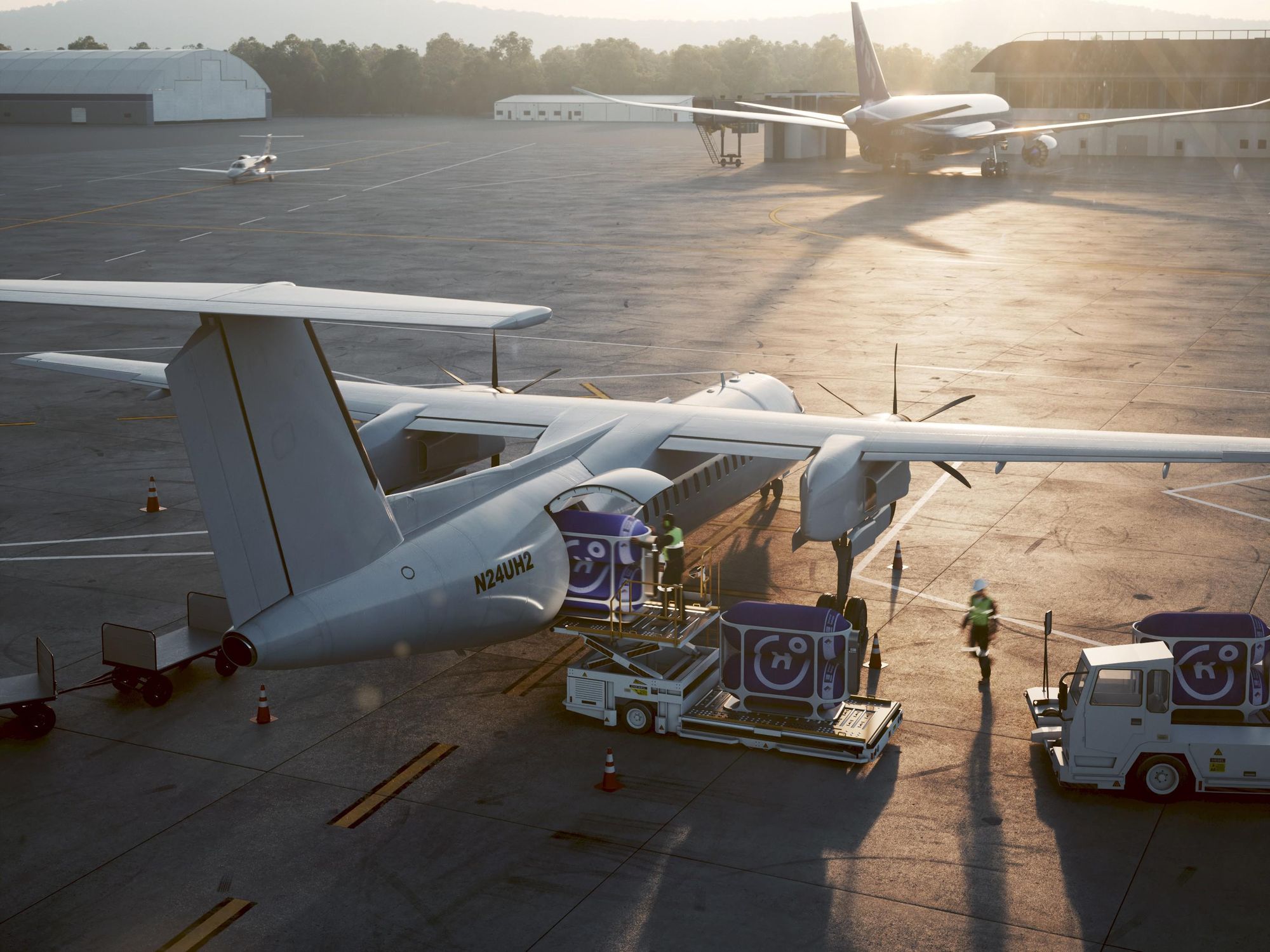Universal Hydrogen Gets $20M to Retrofit Planes with Zero-Emission Technology
Zac Estrada is a reporter covering transportation, technology and policy. A former reporter for The Verge and Jalopnik, his work has also appeared in Automobile Magazine, Autoweek, Pacific Standard, Boston.com and BLAC Detroit. A native of Southern California, he is a graduate of Northeastern University in Boston. You can find him on Twitter at @zacestrada.

The local startup is planning to retrofit hydrogen power into aircraft aiming to get commercial flights powered by renewable energy in four years.
Hawthorne-based Universal Hydrogen announced Thursday it raised $20.5 million in Series A financing round with a syndicate involving Airbus Ventures, JetBlue Technology Ventures, Toyota AI Ventures, and led by Palo Alto-based venture fund Playground Global.
Founded in 2020, Universal Hydrogen is seeking to eliminate carbon emissions during flight using liquid hydrogen, —produced using renewable power — to feed fuel cells.
"The issue is that the aviation sector is one of the last to decarbonize, but the solution exists," Universal Hydrogen co-founder and CEO Paul Eremenko said in an interview.
The company is developing hydrogen fuel cell retrofit kits for existing regional commercial aircraft with between 40 and 60 seats. Universal Hydrogen has a goal of having the first commercial flight with a hydrogen-powered aircraft by 2025, with initial running costs it says would be equivalent to a conventionally-powered plane and eventually decrease.
Aircraft account for 10% of U.S. transportation emissions and 3% of the nation's total greenhouse gas emissions, according to the EPA.
But as passenger air travel is expected to grow over the next decade or two, and other sectors — including the automotive sector — are making aggressive moves to reduce carbon emissions, it will become even more important for the aviation sector to decarbonize, Eremenko said.
"We want to be the catalyst for that shift," he said.
Airbus has said hydrogen is increasingly considered one of the "most promising zero-emission technologies for future aircraft." Last year, it released hydrogen aircraft concepts that could enter service by 2035.
Universal Hydrogen says the Series A funding will allow it to continue developing the retrofit kits, as well as build a fuel distribution network that uses existing freight services and avoids significant renovations to pipelines and other current fueling networks. Earlier this year, it received an investment from Trucks Venture Capital to scale its Los Angeles-area engineering operations to build liquid hydrogen modules and work on powertrain development.
Ideally, Eremenko wants airlines like Boeing and Airbus to equip their airplanes, like the 737 MAX, with hydrogen fuel technology for aircraft that will go into service in the 2030s.
Eremenko used the analogy of Nespresso to explain the business model. Nespresso created the coffee capsule technology, but needed to build the first coffee maker to demonstrate how the capsules work. Now, other companies have built coffee makers that use the capsules.
"In the long run, we want other people to build coffee makers that work with our capsules," he said. "We don't want to be in the coffee maker business, we want to be in the capsule business."
Universal Hydrogen's funding announcement came the same day President Joe Biden committed the United States to at least halving the country's greenhouse gas emissions from 2005 levels by the end of the decade. In a separate move, the Biden administration said it would allow California and other states to create their own emissions standards and zero emissions mandates, reversing a 2019 rule by the Trump administration that blocked such measures. California and 23 other groups later sued that administration.
While Biden and Transportation Secretary Pete Buttigieg's focus this year has been on plug-in electric vehicles and the charging stations they require, hydrogen is having a moment in California, with several companies championing the technology, especially for commercial purposes.
Toyota has operated hydrogen-powered Class 8 semi-trailer trucks at the Port of Los Angeles since 2017. On Thursday, TravelCenters of America said it would install hydrogen stations through a new eTA subsidiary, with a partnership including heavy-duty truck startup Nikola and a $4 million grant from the California Energy Commission.
- Universal Hydrogen Plans for a Hydrogen-Fueled Airline - dot.LA ›
- Pete Buttigieg’s New Job: EV Mythbuster - dot.LA ›
Zac Estrada is a reporter covering transportation, technology and policy. A former reporter for The Verge and Jalopnik, his work has also appeared in Automobile Magazine, Autoweek, Pacific Standard, Boston.com and BLAC Detroit. A native of Southern California, he is a graduate of Northeastern University in Boston. You can find him on Twitter at @zacestrada.
Favot is an award-winning journalist and adjunct instructor at USC's Annenberg School for Communication and Journalism. She previously was an investigative and data reporter at national education news site The 74 and local news site LA School Report. She's also worked at the Los Angeles Daily News. She was a Livingston Award finalist in 2011 and holds a Master's degree in journalism from Boston University and BA from the University of Windsor in Ontario, Canada.





 Image Source: Skyryse
Image Source: Skyryse